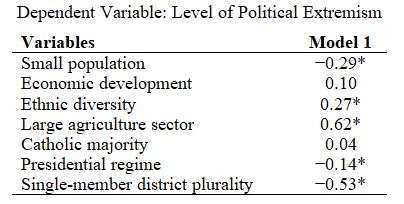Brazil is a large, ethnically heterogeneous, primarily Catholic country. It has a presidential system with proportional representation electoral laws. Based on this description and the hypothetical regression results below, what factors about Brazil encourage political extremism? What factors discourage political extremism? Which have no effect?

What will be an ideal response?
• Variables relevant to Brazil that encourage extremism: Having a large population (instead of a small one), ethnic heterogeneity, and proportional representation electoral rules (instead of SMPD).
• Variables relevant to Brazil that discourage extremism: Presidential regime.
• Variables relevant to Brazil that have no effect on extremism: Catholic majority.
• Variables that have significant coefficients but that are not mentioned in the information about Brazil given in the question: Economic development, having a large agriculture sector.
You might also like to view...
A nation's increased communication positively correlates with increased modernization
Indicate whether this statement is true or false.
The goal of the World Trade Organization (WTO) dispute settlement process is to
a. punish the offending member. b. determine right and wrong. c. mediate conflict. d. enforce American economic values and enhance the economic position of the United States in the world.